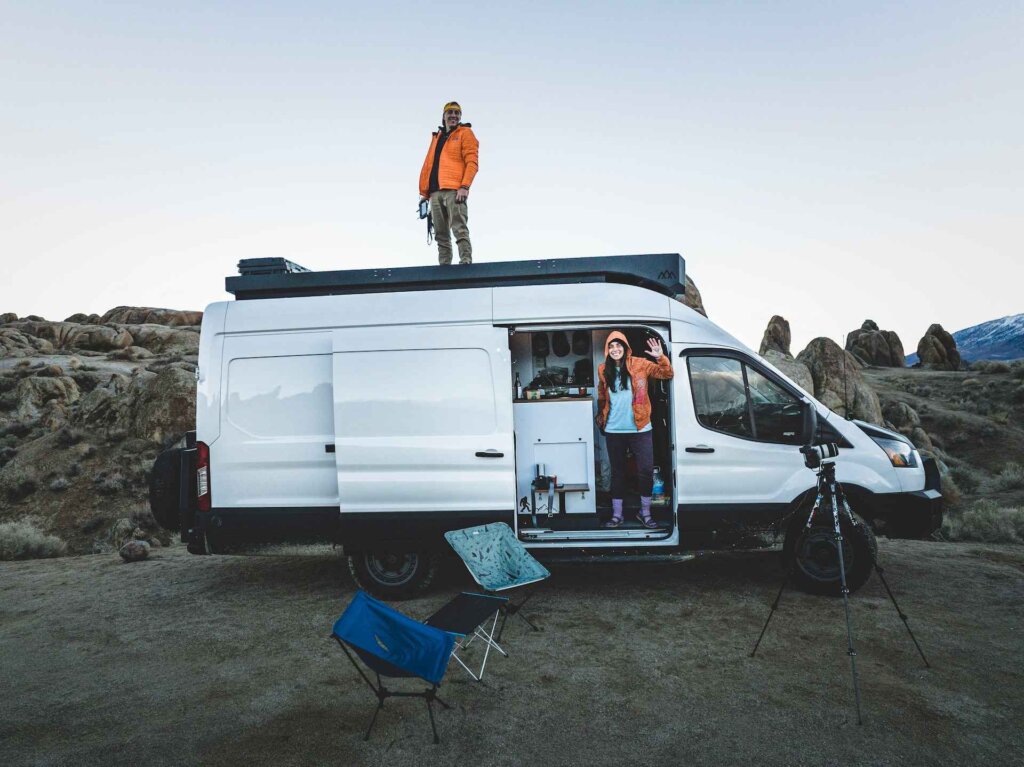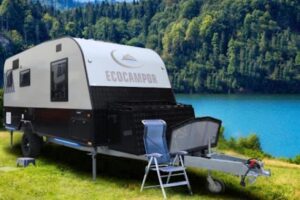It’s time to clear the air. Today I’m going to discuss the actual expenses an average person will face if they choose to live in an RV full-time.
Anyone considering a transition into full-time RV life should have a comprehensive understanding of the associated expenses. This understanding will help them to determine whether it is a cost-effective lifestyle choice and if RV life will save them money in the long run.
Overview of costs
The average cost of living is rising across the North American continent. It’s draining bank accounts, increasing stress, and forcing people to think critically about their weekly, monthly, and annual living expenses.
Depending upon a person’s desired lifestyle, living in an RV full-time can be significantly cheaper than traditional living, cost about the same, or be much more expensive.
Here’s a breakdown of the most common costs associated with #RVlife.

Vehicle fuel
Some RVers have large monthly fuel budgets as they know that they plan to travel often and travel far. These nomadic RVers prefer an ever-changing horizon and don’t mind paying for the fuel to chase it.
Other, more sedentary RVers, don’t even need to create a fuel budget. Perfectly content posting up in one location for months at a time, these RVers live in a travel rig, but hardly travel. Neither of these options is “better” than the other, as both satisfy the RVer’s soul-desire.
Fast-moving RVers who live life on the road report monthly fuel budgets of between $300 and $700, depending upon what gas prices are at the time.
On the high end of that range are the motorhome owners who experience poor fuel economy from the weight and size of their rig. The low end of the range is occupied by lightweight RV owners who live in campers like teardrop trailers and vans.
Stationary RVers who live for months at a time in one location can have a monthly fuel budget of zero if they want. Between bikes, walking, and public transportation, there is theoretically no need to spend money on fuel. But realistically, even non-moving RVers use their car to get around and should assume a monthly fuel budget of at least $50 to $100.
Maintenance
An annual budget for RV maintenance is tricky to determine, as everyone has different personal philosophies on how much time and money to invest in preventative maintenance on a vehicle. So, to make this easier, let’s assume everyone wants their rig to last, and is willing to spend the money to make that happen.
The age of a camper is a determining factor for maintenance budgets. Older rigs typically need more frequent maintenance and repairs. Similarly, the quality of a rig plays a big role; luxury RVs can rack up a big bill at RV repair shops, while cheaper brands are less expensive to have worked on.
Personally, I have never spent more than $1,200 annually for preventative maintenance on my RVs. This number comes from years where I have managed to avoid costly replacements or repairs. Some years I have had to replace all four tires, multiple appliances and perform big mechanical repairs. Those years sucked and cost me significant cash.
All things considered; I would wager that RVers spend, on average, roughly $2,000 a year on maintenance. It’s important to remember this number is an (estimated) multi-year average. Most years will be lower than that, while some are higher.
Insurance

According to lendedu.com, a website dedicated to helping everyday people make educated financial decisions, annual RV insurance premiums for full-timers can cost between $2,000 and $3,000. This is a large number, and for many full-timers, represents one of their largest annual expenses.
Many factors contribute to the number an insurance company will quote for insuring a rig. These criteria inform the insurance provider of the risk they are taking by insuring the camper, and how much they should be compensated for that service.
Factors that influence RV insurance cost:
- Age of the RV in years and miles
- Make and model
- Frequency of use
- Age, gender, and marital status of owner
- RV safety features (anti-lock brakes, lights, etc.)
- Overall driving experience of owner
- Claims history
- Driving record of owner
It’s also important to note that different types of RVs can have different associated insurance costs. Motorhomes will almost always be more expensive to insure than travel trailers and truck campers.
Never own or drive an uninsured vehicle or RV. It is dangerous, irresponsible, and illegal.
Parking fees
On to the second most expensive aspect to full-time RV living: Parking fees.
Like fuel, monthly parking expenses for an RV are dependent on the lifestyle of the RVer. Boondockers can go months without paying a cent in parking fees. RV park dwellers can pay as little as $100 a month or as much as $100 a night for a parking spot in an RV park or campground.
At RV parks, the site fee also buys access to hookups like potable water and electricity, and access to dumping stations. Some parks even have luxury amenities like Wi-Fi, shower facilities, and laundry services.
Boondockers have to be incredibly self-sufficient to boondock full-time. This is best done by investing in powerful, high-quality solar power systems, through careful usage of water and power, and by being content with a simple lifestyle.
An additional fee that boondockers have to face is for access to dump stations to empty their waste tanks. This can be done for around $20 at most RV parks.
Food
Recently, there has been much discussion over the cost of food in the United States. It seems as though food prices are rising with no end in sight. For this reason, full-time RVers looking to save money need to be very careful about their monthly food expenditures.
What does this caution look like? It looks like not going out to eat more than once or twice a month, making smart decisions at the grocer, and not wasting food.

The United States Department of Agriculture says that right now, two adults should have a weekly food budget of between $120 and $150. Sticking to a budget like this requires collaboration and diligence. It’s not easy but it can be done.
Other costs
In addition to the above expenses, there are a myriad of other expenses that people face regardless of if they live in an RV, house, apartment, or boat. These expenses include:
- Health insurance: $300-600 per month
- Clothing: $50 per month
- Entertainment: $300 per month
- Cell phone: $100 per month
- Personal maintenance (products, haircuts, etc.): $50 per month
- Miscellaneous: $100 per month
The above figures are drawn using national averages, common sense, and personal experience. Some people will pay much more, and many will pay much less for these things.
With that said, these expenses reach a whopping $1,000 per month when added together. That’s a hefty bill for just being alive. These costs can be reduced by limiting entertainment expenses, unsubscribing from unnecessary services, and spending less on personal grooming and clothing.
Final sum
If you add all of the above costs, monthly RV living expenditures range from $1,500 to $4,000. I’ve had friends live the full-time RV life for as little as $1,000 a month, but that requires a lot of sacrifices, and I honestly wouldn’t suggest it for most people.
I average around $2,000 when living on the road full-time. This number goes up the more I travel around, and down when I’m sitting still. Aside from increased fuel consumption, I spend more money when I travel because I love visiting new breweries when passing through a town, and craft beer is expensive.
But what will it cost you? Hard to say. Think critically about the above factors and try to create a personalized monthly RV budget. It’s fun to consider how you may be able to spend less or more money by tweaking variables.
Cost of traditional living
So, how does this monthly budget of, let’s say, $2,500 compared to living in a traditional dwelling like a house or apartment?

The U.S. Bureau of Labor Statistics released a report in 2021 that indicates national averages for cost of living. According to this report, a single person has monthly living expenses of $3,405. For two people, that number jumps to $5,782.
Expensive? Yes, incredibly. Comparable to RV living? Unfortunately, also yes.
But herein lies the beauty of RV living: It is significantly easier to cut expenses and save money while living in a camper than when living in a house or apartment.
If you don’t want to pay RV park fees, just start boondocking. Spending too much on electricity? Invest in solar panels and spend more time outside, not consuming power. Are monthly food costs too high? Start buying generic brands and shopping for nourishment instead of pleasure.
Benefits of full time RV living
The benefits of living in an RV far outweigh the drawbacks. Keep in mind though, that those words are being written by an RV fanatic; someone who will trade comfort for freedom, and extravagance for simplicity.
I consider these to be the biggest advantages to living in an RV full-time:
- Increased time spent in the natural world
- Decreased stress from urban life
- Ability to save money
- Ease of traveling to see friends and family
- Boosted confidence and sense of self-worth
- Improvement of DIY skills
- Forced minimalism promotes simplicity in life, and can lower carbon footprint
Honestly, I could go on forever. I think there are numerous, almost infinite benefits to spending at least some significant amount of time in life living out of an RV. Nomadism isn’t for everyone, but it’s a fun experiment that can teach a person a lot about themselves.
Real-life examples
So, who actually pursues this life?
Well, you are asking the right guy because me and my crew of hedonistic ski bums, river rats, travelers, and mountain climbers have all lived in an RV at some point or another.
Here are four examples of friends I have known to live in an RV, and why they did it.
School
After many years of life as a wilderness guide, a close friend decided that she wanted to return to school and pursue an education that would promote future stability. The school she chose was far from her network of friends and family, so she wasn’t able to find reasonably cheap accommodation like she normally could.
The solution? She towed a travel trailer across 5 states and moved into a cheap RV park while going to school.
This not only saved her money, but also helped her to focus on her education while in a new place.
Seasonal work
The vast majority of my friends who have lived in a camper were seasonal workers such as ski resort workers, river guides, and Alaskan fisherman. Unfortunately, it’s hard to find short leases that jive with the fast-paced, flighty lifestyle that accompanies seasonal work.
The solution? They take their home with them as they travel and work seasonally.
The same camper that you see in a ski resort parking lot might be parked in a riverside campground come summertime. RV life eliminates the need for silly lease contracts.

Saving money
In the past couple of years, multiple friends of mine have begun to save up money to buy a house. This is a super exciting process and represents a fun new chapter in their lives. Due to absurd rent prices where we live, saving money for a down payment was an excruciatingly slow process.
The solution? Two couples I know moved into RVs and stopped paying rent. Hello savings!
I consider living in an RV to be one of the best ways a person can begin saving money for a down payment on a house. Rent is ridiculously expensive, and not everyone has parents they can -or want to- move back in with.
Travel
I believe that everyone should try to travel while they are still young. Youth provides us humans with energy, bravado, and an insatiable appetite for adventure. But, as a few of my wanderlusty friends have figured out, travel isn’t easy when you have rent, a commute, and a silly desk job.
The solution? They bought a van, converted it into a camper, picked up remote jobs, and hit the road.
Now they are the van-dwelling digital nomads we all hear so much about these days. Van life has opened the doors to a freeing life of adventure and new horizons. Interestingly, after a while, wanderlust turns into home-lust, and these friends eventually meander back.
Frequently asked questions
Check out what some of our readers are asking about the cost of full-time RV life.
How do I save money on RV park fees?
Some companies offer memberships that gain RVers access to hundreds, sometimes thousands of RV parks for discounted prices. These memberships sometimes offer additional discounts on fuel, retail goods, and food.
Is boondocking legal?
While most states have at least some federally managed land in which boondocking is perfectly legal, every state has unique rules dictating where boondocking is and is not allowed. Do thorough research and know before you go.
Is RV living a good idea?
RV living can be an excellent choice for those who value flexibility, simplicity, and adventure. Living in an RV allows you to travel and explore new places without being tied down to a specific location. It can also be a cost-effective option, particularly if you’re traveling to cheaper areas. Additionally, RV living can help you downsize and simplify your life, with less clutter and fewer possessions
Conclusion
I am a firm believer that living in an RV can help people save money. Not everyone can pull it off, but those that can are able to increase savings and life satisfaction at the same time. Not too bad, eh?
Happy camping, friends.



